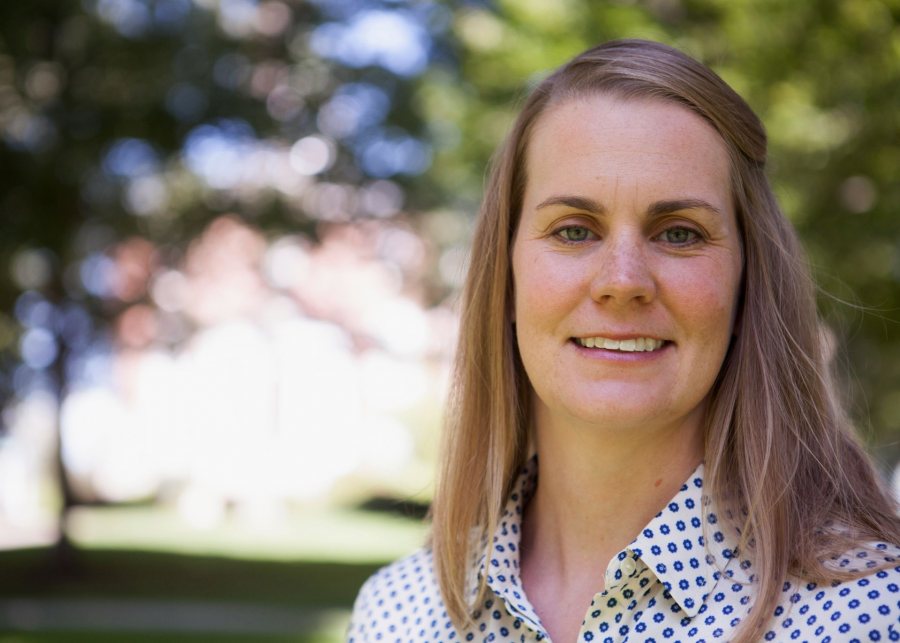Purposeful Work
How colleges help students find purpose in their work — The Chronicle of Higher Education
In a major feature story, The Chronicle of Higher Education explores the value of the college’s signature Purposeful Work initiative.
Now beginning its fifth year of implementation, Purposeful Work helps students “clarify the connections between classroom and career, and to prepare students for lives of meaningful work,” writes Kelly Field of the Chronicle, the leading source of academic news in the U.S.
Purposeful Work stands apart, says Field, for how it “blends the philosophical and the pragmatic.”
Purposeful Work is particularly valuable because it helps to “increase graduates’ confidence that they can succeed in an increasingly technical work force, and to dispel parents’ and policy makers’ doubts about the returns on an expensive liberal-arts degree.”
While many colleges are launching similar programs, Purposeful Work stands apart, says Field, for how it “blends the philosophical and the pragmatic, offering students both concrete skills and an overarching theory of work: namely, that it ought to have both personal meaning and societal relevance.”
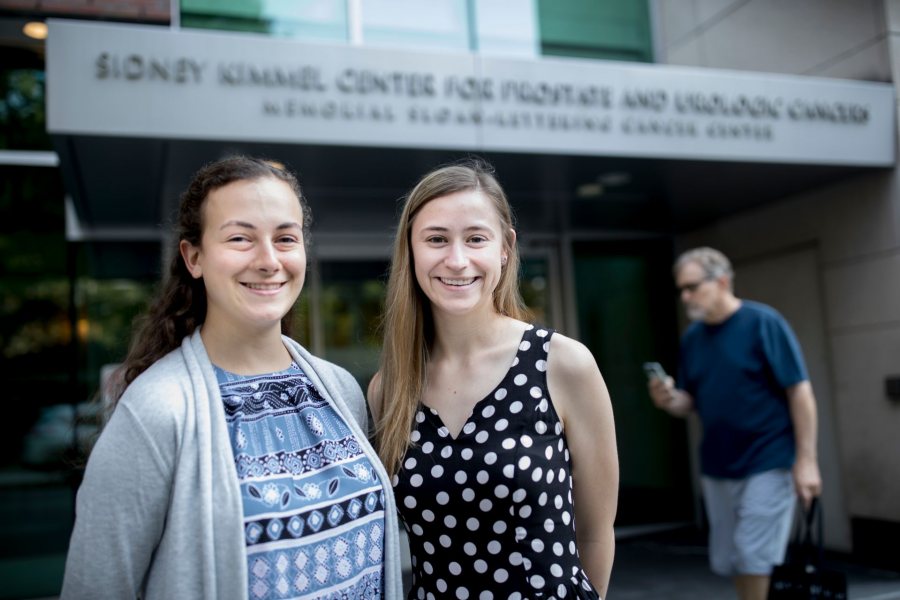
Purposeful Work interns in summer 2018, Isabella Del Priore ’19 and Emily Lufburrow ’19 pose outside the Sidney Kimmel Center for Prostate and Urologic Cancers at Memorial Sloan Kettering in New York City. (Phyllis Graber Jensen/Bates College)
Andrew Knowlton ’97
Portland, Maine, is the 2018 Restaurant City of the Year — Bon Appetit
Andrew Knowlton ’97, Bon Appetit’s longtime restaurant editor and now editor at large, named Portland the 2018 Restaurant City of the Year, citing the city’s many new openings and the variety of offerings, from “an Instagram-worthy lobster roll and a dozen local oysters” to “the killer pho spot or the guy selling hand rolls out of a Yeti cooler.”
Knowlton brings some subjectivity to the selection. “I’ve got a thing for Maine,” he wrote. “I went to college there, I got married there, I regularly vacation there.” But Portland was not picked just out of “blind favoritism,” he explains, offering a long list of restaurants as evidence.
Among the spots mentioned are Hugo’s, one of three eateries co-owned by award-winning chef Andrew Taylor ’03, and Allagash Brewing Company, whose brewmaster is Knowlton’s classmate Jason Perkins.
Mia Lidofsky ’09
‘Strangers’ creator Mia Lidofsky breaks the mold with queer female narrative — Huffington Post
As the second season of Strangers wrapped, director and producer Mia Lidofsky ’09 talked to Curtis M. Wong of the Huffington Post about how her own life has inspired the Facebook Watch show and the importance of narratives created by and featuring queer people.
Strangers follows a bisexual woman and her lesbian best friend, a “self-discovery tale against the backdrop of Airbnb,” Wong wrote.
Lidofsky, who worked on the shows Girls and Nurse Jackie as an assistant to director Jesse Peretz, told Wong she wanted to make women feel “feel more seen, more heard and less alone.”
“I wanted to show queer women in a positive light, and show their hilarity, their beauty and their charisma,” she said. “The more depictions of queer people onscreen by queer people, the better.”
Matt Golden ’20
How Matt Golden started a lunchtime mentorship program in Maine that is reaching New Bedford — SouthCoastToday
Brendan Kurie of the New Bedford Standard-Times profiled Matt Golden ’20, who started a program called Aspiration Lunches at Lewiston Middle School.
A sociology major and football player, Golden and fellow Bates students make regular visits to LMS, where they hang out with students and, importantly, give them a chance to see what it’s like to be a college student.
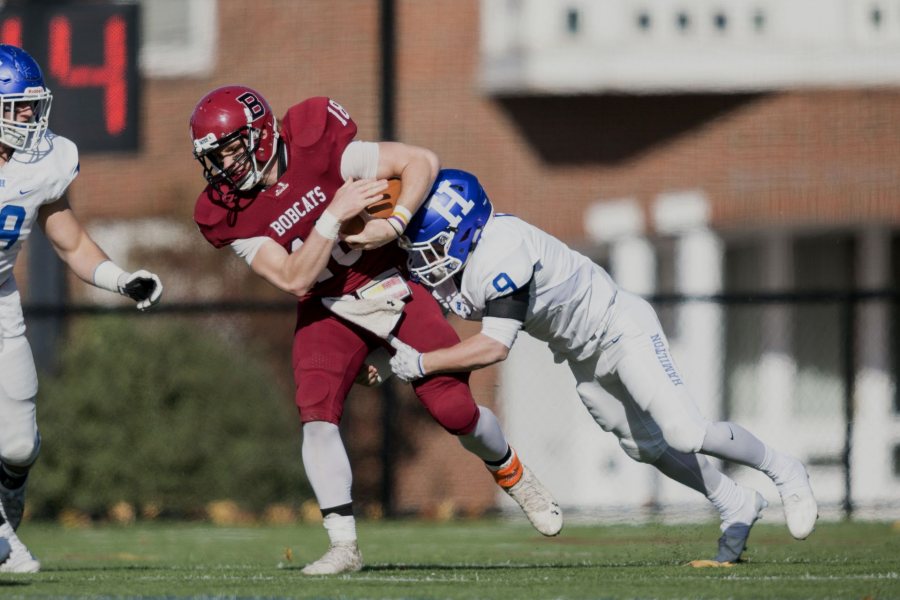
Matt Golden ’20 of New Bedford, Mass., carries the ball during a 2016 game against Hamilton College. (Josh Kuckens/Bates College)
“Students talking to other students is a big thing,” Lewiston Middle School administrator Billie Jo Brito told Kurie.
“It’s so hard for middle school students, many times, to get out of their own way. To be encouraged by a college student and hear about their middle school days and have that fresh face is such a positive thing for them.”
Golden got support from the college’s Harward Center for Community Partnerships, but “this was his initiative,” said Martha Deschaines ’75 of the Harward Center. “He’s so enthusiastic and dedicated to this program and helping youth to move forward.”
Clayton Spencer
Women to Watch: Clayton Spencer, Bates College — Mainebiz
Mainebiz named Bates President Clayton Spencer one of four “Women to Watch” in 2018. In a profile, editor Peter Van Allen outlined Spencer’s path from law to higher education, her leadership of the $300 million Bates Campaign, and her drive to prepare students for meaningful careers through the Purposeful Work initiative.
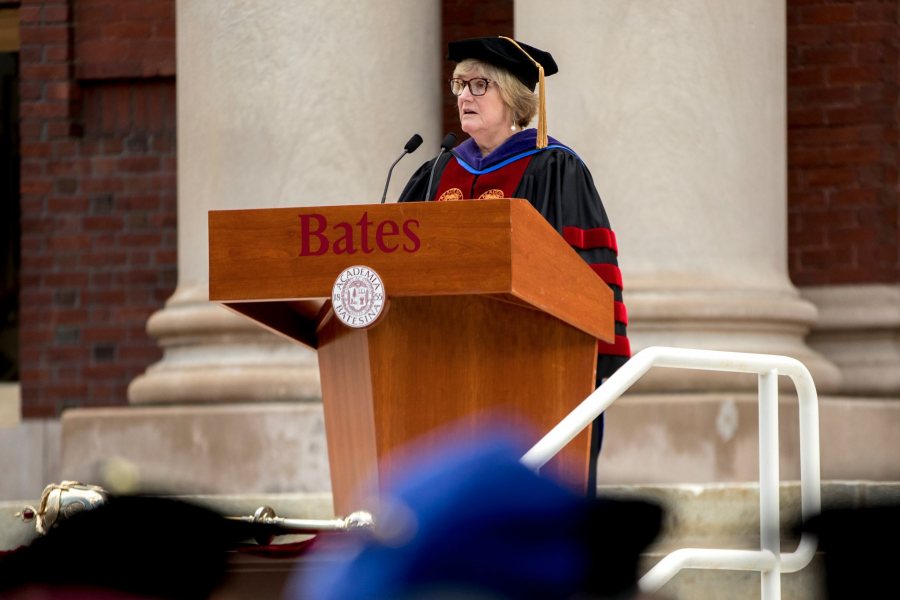
Bates President Clayton Spencer speaks during Convocation on Sept. 4. (Phyllis Graber Jensen/Bates College)
“Most students realize they’re not da Vinci or Yo-Yo Ma,” Spencer said. “They worry they don’t have a passion. But finding your passion is a trap. You have to try things.”
“Work can be for pay or not,” she added. “But it has to be purposeful work.”
Sameer Maskey ’02
Here’s why we need to democratize artificial intelligence — Forbes
In an essay published in Forbes, Sameer Maskey ’02 says the world needs a lot more artificial intelligence professionals than it currently has.
The founder and CEO of Fusemachines, a Manhattan-based AI services and education firm, Maskey argues that students from developing countries should fill the gap — they’re as curious and qualified as Ivy League grads, and “someone who experiences complex problems in his/her own country could be more suited to try and solve those problems with AI.”
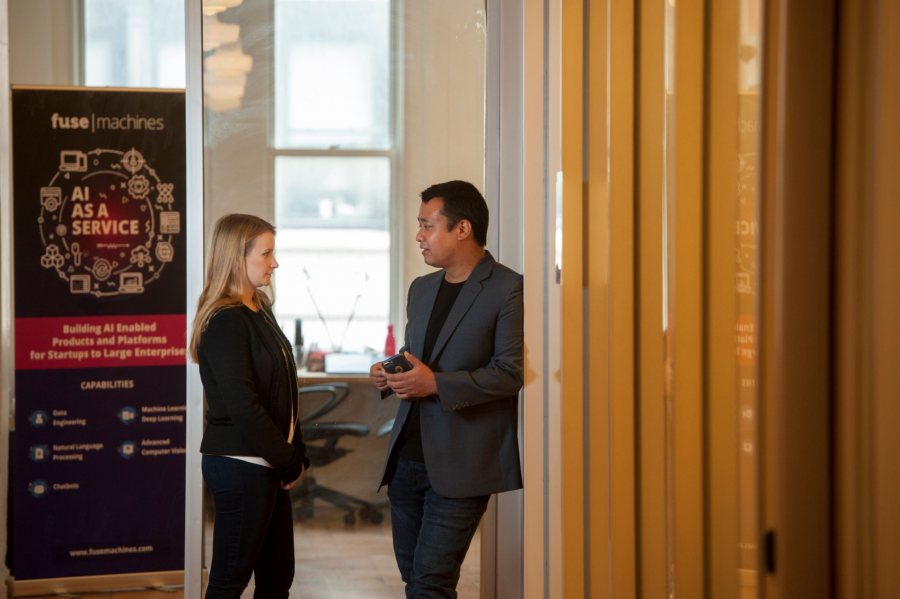
Kristyma Alexova ’19 and Sameer Maskey ’02 speaks with Kristyna Alexova ’19 during Alexova’s Purposeful Work internship at Fusemachines, Maskey’s AI company. (Nick Romanenko for Bates College)
Maskey, a member of the Forbes Technology Council, which comprises world-class CIOs, CTOs, and technology executives, recently started a fellowship program to teach machine learning to students in the Dominican Republic, New York City, Rwanda, and Maskey’s native Nepal.
“If we want everyone to benefit from the development of AI, and not just a few select countries, we need to make AI equally accessible around the world,” Maskey says.
David Bowie ’69
David Bowie welcomes Lewiston High students back for the 51st time — Sun Journal
Bonnie Washuk of the Lewiston Sun Journal profiled David Bowie ’69, who has been teaching Lewiston High School students and coaching fellow teachers for 51 years.
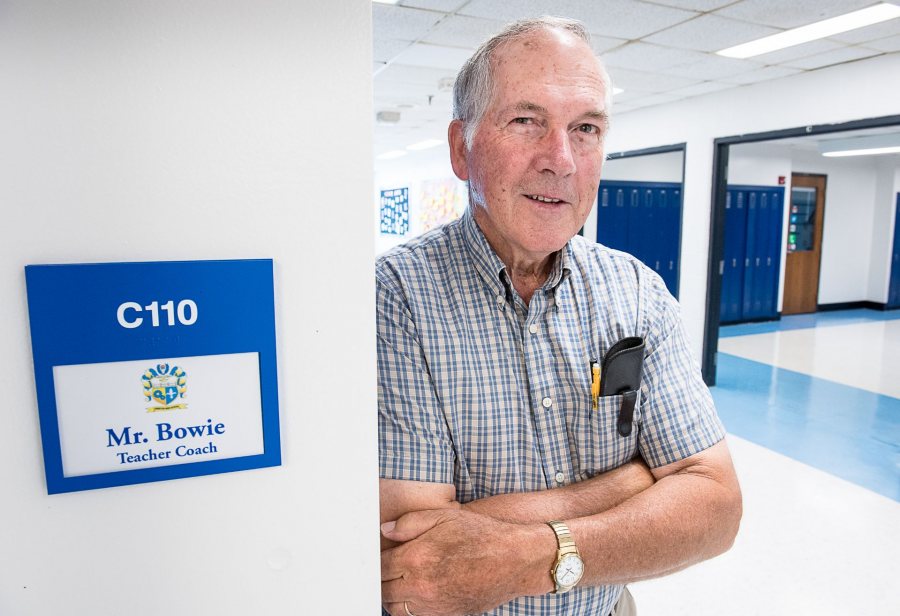
David Bowie poses in the hall by the door of his office at Lewiston High School, where he has taught for 51 years. (Russ Dillingham/Sun Journal)
Bowie has witnessed dramatic changes over his five decades in the classroom. Standardized testing became more important, technology progressed — Bowie was one of the first to learn to use computers — and the student population became far more diverse.
Now some of his former students are teachers at the high school, and he sees people he taught at LHS in town. “I usually run into somebody I had in a class, which makes it kind of fun,” Bowie told Washuk.
Dominick Pangallo ’03
McCain’s straight talk impressed those on the North Shore — The Salem News
Ethan Forman of The Salem News quoted Dominick Pangallo ’03 on the Aug. 25 death of U.S. Senator John McCain.
Pangallo, now chief of staff for the mayor of Salem, was a Bates student in 2000 when he worked in New Hampshire for McCain’s first presidential campaign. He wrote that though McCain was the only Republican he ever voted for, he admired the senator’s stance on campaign finance reform, as well as his relationship with the press and, later, his position on climate change and his vote against the repeal of Obamacare.
“Tonight, I’m remembering those cold and snowy nights across countless small Granite State towns, running lawn signs, holding the rope line, setting up stages, handing out palm cards,” Pangallo wrote of working on the campaign. “The thrill of being in the vanguard of the Straight Talk Express.”
Mara Tieken
The comeback kids: how a struggling public school made the grade — The Guardian
Amanda Holpuch of The Guardian turned to Associate Professor of Education Mara Tieken for a story about the school district in Pike County, Ala., which has many students from poor rural backgrounds.
The district closely watches and tries to support its students, and offers programs that allow students to earn college credits and even associate’s degrees in a variety of fields.
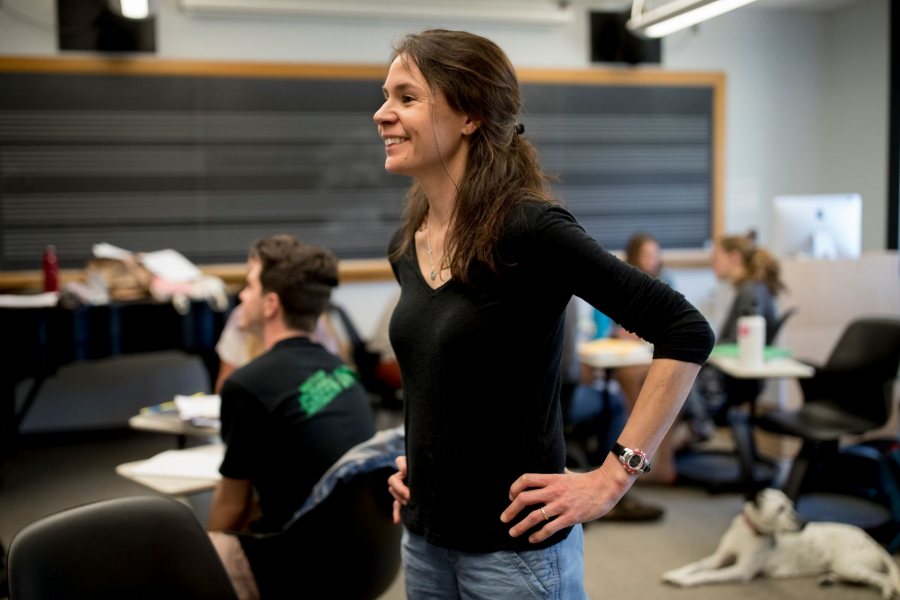
Associate Professor of Education Mara Tieken teaches “Community Organizing for Social Justice” in May 2018. (Phyllis Graber Jensen/Bates College)
Tieken praised that dual enrollment program, but offered this caution:
“What I worry about is rural kids, particularly rural students of color, being disproportionately tracked into associate’s degrees, so then they are not able to continue on with education, which we know corresponds with higher earnings and all kinds of other benefits.”
Katharine Ott
GirlsGetMath engages local high school students — The Brown Daily Herald
Brown University’s student newspaper covered a weeklong summer program at the university, directed by Associate Professor of Mathematics Katharine Ott, that teaches high school girls about math and computer science.
Ott told reporter Cate Ryan that the program seeks to encourage girls to stay engaged with math and science in high school and college and, ultimately, pursue careers in STEM fields.
“There is clear evidence that even though jobs in STEM are growing very rapidly and they pay better than a lot of other jobs, women are very underrepresented in these careers,” Ott said.
The program, GirlsGetMath@ICERM, was hosted by Brown’s Institute for Computational and Experimental Research in Mathematics.
Anita Charles
French schools say ‘au revoir’ to smartphones — what if the U.S. dialed up a similar ban? — KPCC-FM
Schools in France instituted a ban this year on cellphones on school grounds. Larry Mantle of Pasadena-based public radio station KPCC explored how such a policy might translate in the United States, talking with Bates’ Anita Charles and the University of Michigan’s Liz Kolb about the effectiveness of cellphone bans.
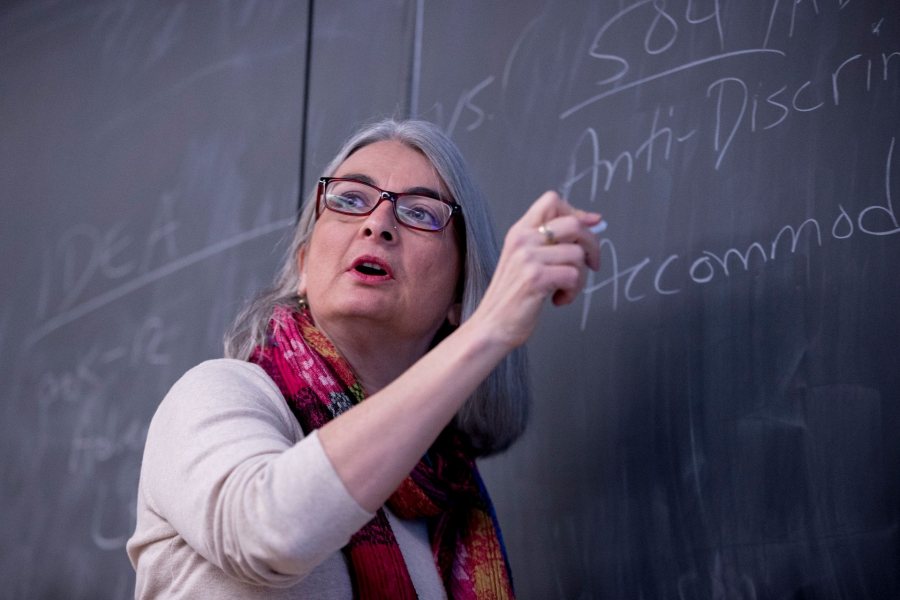
Anita Charles teaches “Basic Concepts in Special Education” in March 2018. (Phyllis Graber Jensen/Bates College)
Charles, lecturer in education and director of secondary teacher education, told Mantle and several callers that outright bans on cellphones are “seldom effective, it’s unenforceable, and it begs for subversion.”
Whether schools and teachers allow cellphones in the classroom or require students to put their phones in a cubby, they have to develop relationships of trust, Charles said.
“We tend to miss the boat if we’re only about the policy,” she said. “We have to also have the conversations. We have to talk to students about why and how and what are we trying to help them do when they put them in that cubby, and what we hope they’ll learn to understand about appropriate contexts.”
